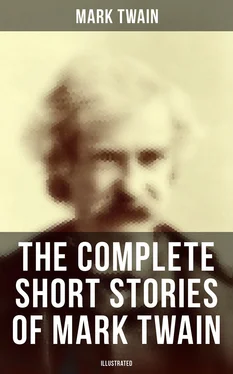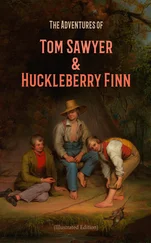The fact is, it was something more than simply "rough enough" on them; it was altogether too rough; half of them left, and the other half would have followed, but Mrs. Jones saved them by discharging me from the premises.
I only stayed one night at my next lodging-house. Mrs. Smith was after me early in the morning. She said, "You can go, sir; I don't want you here: I have had one of your kind before—a poor lunatic, that played the banjo and danced breakdowns, and jarred the glass all out of the windows. You kept me awake all night, and if you was to do it again, I'd take and mash that thing over your head!" I could see that this woman took no delight in music, and I moved to Mrs. Brown's.
For three nights in succession I gave my new neighbours "Auld Lang Syne," plain and unadulterated, save by a few discords that rather improved the general effect than otherwise. But the very first time I tried the variations the boarders mutinied. I never did find anybody that would stand those variations. I was very well satisfied with my efforts in that house, however, and I left it without any regrets; I drove one boarder as mad as a March hare, and another one tried to scalp his mother. I reflected, though, that if I could only have been allowed to give this latter just one more touch of the variations, he would have finished the old woman.
I went to board at Mrs. Murphy's, an Italian lady of many excellent qualities. The very first time I struck up the variations, a haggard, careworn, cadaverous old man walked into my room and stood beaming upon me a smile of ineffable happiness. Then he placed his hand upon my head, and looking devoutly aloft, he said with feeling unction, and in a voice trembling with emotion, "God bless you, young man! God bless you! for you have done that for me which is beyond all praise. For years I have suffered from an incurable disease, and knowing my doom was sealed and that I must die, I have striven with all my power to resign myself to my fate, but in vain—the love of life was too strong within me. But Heaven bless you, my benefactor! for since I heard you play that tune and those variations, I do not want to live any longer—I am entirely resigned—I am willing to die—in fact, I am anxious to die." And then the old man fell upon my neck and wept a flood of happy tears. I was surprised at these things; but I could not help feeling a little proud at what I had done, nor could I help giving the old gentleman a parting blast in the way of some peculiarly lacerationg variations as he went out at the door. They doubled him up like a jackknife, and the next time he left his bed of pain and suffering he was all right, in a metallic coffin.
My passion for the accordeon finally spent itself and died out, and I was glad when I found myself free from its unwholesome influence. While the fever was upon me, I was a living, breathing calamity wherever I went, and desolation and disaster followed in my wake, I bred discord in families, I crushed the spirits of the light-hearted, I drove the melancholy to despair, I hurried invalids to premature dissolution, and I fear me I disturbed the very dead in their graves. I did incalculable harm, and inflicted untold suffering upon my race with my execrable music; and yet to atone for it all, I did but one single blessed act, in making that weary old man willing to go to his long home.
Still, I derived some little benefit from that accordeon; for while I continued to practise on it, I never had to pay any board—landlords were always willing to compromise, on my leaving before the month was up.
Now, I had two objects in view in writing the foregoing, one of which was to try and reconcile people to those poor unfortunates who feel that they have a genius for music, and who drive their neighbours crazy every night in trying to develope and cultivate it; and the other was to introduce an admirable story about Little George Washington, who could Not Lie, and the Cherry-Tree—or the Apple-Tree—I have forgotten now which, although it was told me only yesterday. And writing such a long and elaborate introductory has caused me to forget the story itself; but it was very touching.
A Page from a Californian Almanac
Table of Contents
At the instance of several friends who feel a boding anxiety to know beforehand what sort of phenomena we may expect the elements to exhibit during the next month or two, and who have lost all confidence in the various patent medicine almanacs, because of the unaccountable reticence of those works concerning the extraordinary event of the 8th inst., I have compiled the following almanac expressly for the latitude of San Francisco:
Oct. 17.—Weather hazy; atmosphere murky and dense. An expression of profound melancholy will be observable upon most countenances.
Oct. 18.—Slight earthquake. Countenances grow more melancholy.
Oct. 19.—Look out for rain. It would be absurd to look in for it. The general depression of spirits increased.
Oct. 20.—More weather.
Oct. 21.—Same.
Oct. 22.—Light winds, perhaps. If they blow, it will be from the "east'ard, or the nor'ard, or the west'ard, or the southard," or from some general direction approximating more or less to these points of the compass or otherwise. Winds are uncertain—more especially when they blow from whence they cometh and whither they listeth. N.B.—Such is the nature of winds.
Oct. 23.—Mild, balmy earthquakes.
Oct. 21.—Shaky.
Oct. 25.—Occasional shakes, followed by light showers of bricks and plastering. N.B.—Stand from under!
Oct. 26.—Considerable phenomenal atmospheric foolishness. About this time expect more earthquakes; but do not look for them, on account of the bricks.
Oct. 27.—Universal despondency, indicative of approaching disaster. Abstain from smiling, or indulgence in humorous conversation, or exasperating jokes.
Oct. 28.—Misery, dismal forebodings, and despair. Beware of all light discourse—a joke uttered at this time would produce a popular outbreak.
Oct. 29.—Beware!
Oct. 30.—Keep dark!
Oct. 31.—Go slow!
Nov. 1.—Terrific earthquake. This is the great earthquake month. More stars fall and more worlds are slathered around carelessly and destroyed in November than in any other month of the twelve.
Nov. 2.—Spasmodic but exhilarating earthquakes, accompanied by occasional showers of rain and churches and things.
Nov. 3.—Make your will.
Nov. 4.—Sell out.
Nov. 5.—Select your "last words." Those of John Quincy Adams will do, with the addition of a syllable, thus: "This is the last of earthquakes."
Nov. 6.—Prepare to shed this mortal coil.
Nov. 7.—Shed!
Nov. 8.—The sun will rise as usual, perhaps; but if he does, he will doubtless be staggered some to find nothing but a large round hole eight thousand miles in diameter in the place where he saw this world serenely spinning the day before.
Information for the Million
Table of Contents
A young man anxious for information writes to a friend residing in Virginia City, Nevada, as follows:
Springfield, Mo., April 12.
"Dear Sir: My object in writing to you is to have you give me a full history of Nevada. What is the character of its climate? What are the productions of the earth? Is it healthy? What diseases do they die of mostly? Do you think it would be advisable for a man who can make a living in Missouri to emigrate to that part of the country? There are several of us who would emigrate there in the spring if we could ascertain, to a certainty that it is a much better country than this. I suppose you know Joel H. Smith? He used to live here; he lives in Nevada now; they say he owns considerable in a mine there. Hoping to hear from you soon, etc., I remain yours, truly,
Читать дальше












